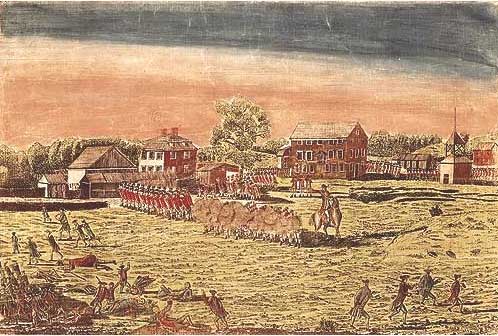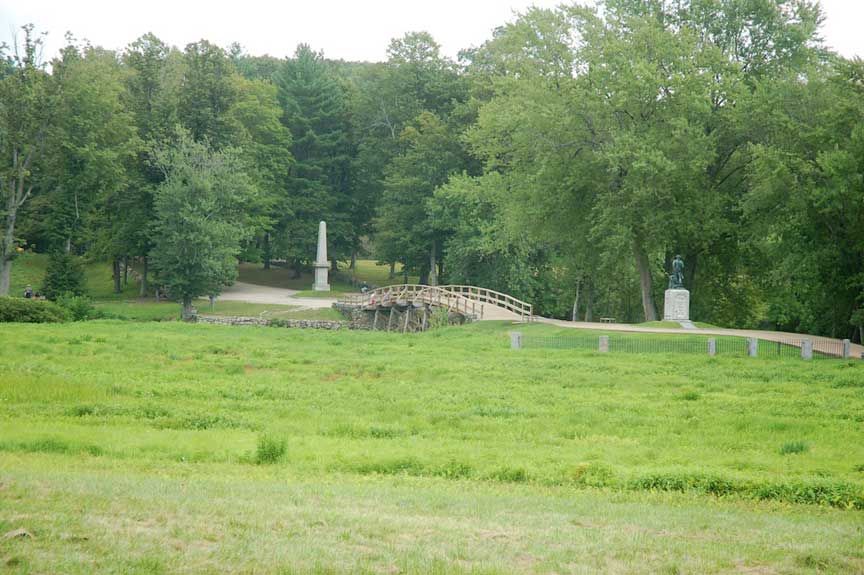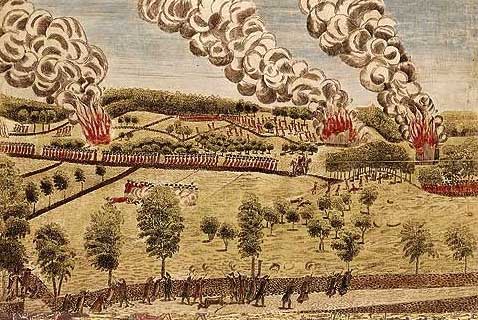Lexington and concord
Forewarned by Paul Revere, American militiamen fought 800 British troops on April 19th, 1775. The battle broke out at Concord. Seventy-three British soldiers were killed and over 200 were wounded. The Americans lost 49 soldiers and suffered 39 wounded. This marked the beginning to Revolutionary War
Late on the night of April 18th, 1775 British troops departed Boston for Concord and Lexington in pursuit of Colonial arms. They crossed the bay by boat and began their march at 2 AM. Forewarned by Paul Revere, Colonial militia from throughout the area began to gather.

By 5AM the first group of British soldiers arrived in Lexington. The British entered Lexington with with six companies, totaling 238 British soldiers. In Lexington, the British found 60 men, a single colony of militia. The British commander on the scene was Major John Pitcairn of the Royal Marines. Major Pitcairn approached the American commander, Captain John Parker and stated: “lay down your arms, you damned rebels”. Parker had no intention of trying to stop the large force of British Regulars with his rag-tag group of dairy farmers and craftsman. On the other hand, he was not willing to agree to surrender arms. Instead, Parker ordered his men on the Commons to step aside and let the British pass.
Then, in the early morning light, a shot rang out. To this day, no one knows who fired this first fateful shot. Though, rang out it did, and it was followed by many more shots, as the British Regulars and some of the militia started firing. The British soldiers bayoneted some of those who fell. Most of the Colonists fled for their lives. When the fighting was over, in a matter of moments, 8 Colonists lay dead, and 9 Colonists were wounded. The British Regulars then spent the next few hours searching Concord for Colonial leaders. Their search was in vain. If Britain's Lieutenant Smith had listened to some of his advisors and returned to Boston at this point, the war might not have started on this day. However, instead he decided to continue toward Concord.
British troops continued to Concord where they quickly occupied the town. They found very little in the town. The armaments that had been stored in Concord had been disbursed. A large group militia were gathering outside the town. Word of the shootings in Lexington had inflamed many of the Colonists. Colonel James Barret, a sixty four-year old miller, who commanded the Concord militia led the Colonists. The Americans were gathered on the far side of the North Bridge. The Americans could see fires coming from the town (as the British were burning whatever arms they found). The Colonists were convinced that the British were burning the town.

The Americans advanced on the North Bridge, which was defended by a contingent of 115 British Regulars. The Colonists advanced across the bridge. A single shot rang out, fired by a British soldier. The rest of the British then opened fire. Barret then gave his own men the order to fire. Twelve of the British Regulars were hit, three fatally. The rest of the British broke and ran.
Colonel Smith decided to retreat from Concord. Smith's men began to fall back along the narrow Concord Road. The battle in Concord became the third part of the battle of the day, and became known as "The Battle of the Road". By this time, 1,000 militia had gathered along the road to harass and attack the British. Captain Parker and the Lexington militia were no longer reluctant to attack the British. A large contingent of American fighters waited for the British at Merriam’s Corner, just a mile to the East of Concord. As they marched back to Lexington, Colonists hid behind trees and stone fences to attack the British from both sides of the road.

The British soldiers retreated as rapidly as they could, and the officers came close to losing control of their soldiers. Just beyond Lexington the British forces were rescued by a force of 1000 reinforcements led by Lord Percy. The British once again advanced on Lexington, capturing the southern part of it and plundering homes there, until the mass of gathering militia became too great. They withdrew to Boston. The Americans harassed them unceasingly on their journey. As Percy, who was no great admirer of the Americans, stated: Whoever looks upon them as an irregular mob, will find himself very much mistaken. Nor are severl of their men void of spirit of enthusiasm as we experienced yesterday, for many of them concealed themselves in houses and advanced within 10 yards to fire at me and other officers, tho they were morally certain of being put to death themselves in an instant. The British were harassed until they crossed Charlestown Neck, at which point the colonist realized that further pursuit would be suicidal. The day was over, and 1,800 British regulars had met some 4,000 Americans. The British had been forced to retreat, losing 65 soldier with an additional 173 wounded. The Americans lost 49 dead and 46 wounded. The war was on - there was no turning back.
 >
>